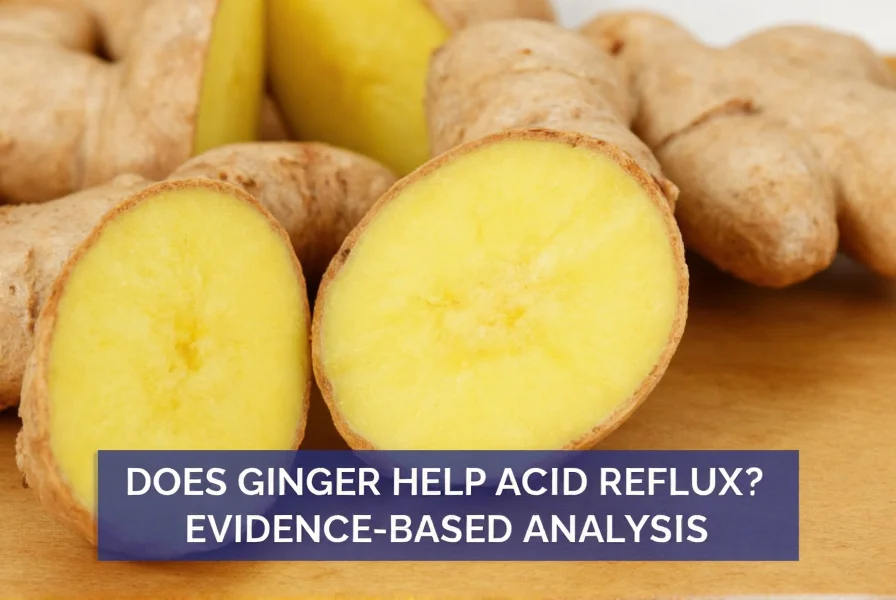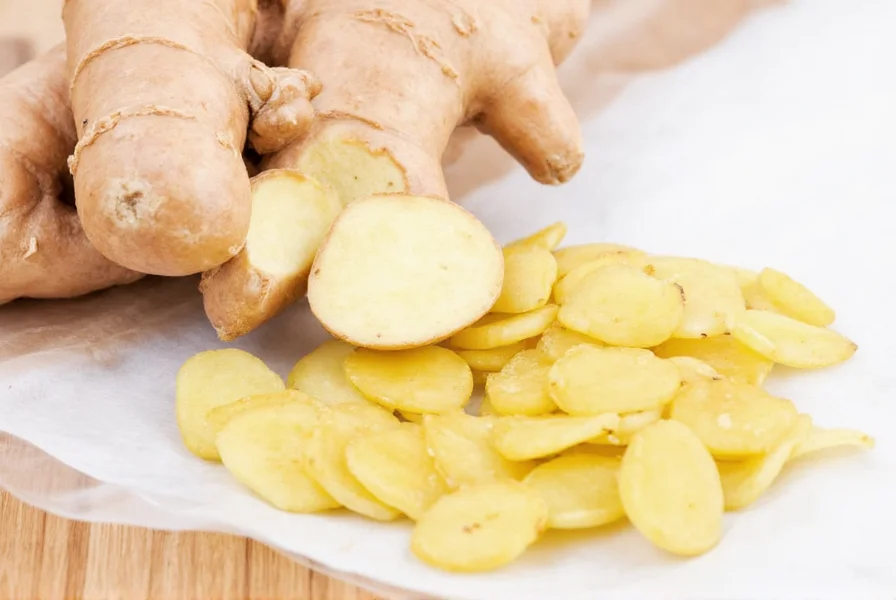Acid reflux, also known as gastroesophageal reflux disease (GERD) when chronic, affects millions of people worldwide. As more individuals seek natural alternatives to conventional medications, many wonder: does ginger help acid reflux? Let's examine what current research reveals about this traditional remedy and its potential role in managing digestive discomfort.
Understanding Acid Reflux and Ginger's Potential Mechanisms
Acid reflux occurs when stomach acid flows back into the esophagus, causing that familiar burning sensation known as heartburn. This happens when the lower esophageal sphincter (LES)—the valve between your stomach and esophagus—weakens or relaxes inappropriately.
Ginger (Zingiber officinale) has been used for centuries in traditional medicine systems across Asia and the Middle East for digestive issues. Modern research suggests several potential mechanisms through which ginger might influence acid reflux:
- Anti-inflammatory properties - Ginger contains compounds like gingerols that may reduce inflammation in the digestive tract
- Gastric motility effects - Some studies indicate ginger may accelerate gastric emptying, potentially reducing the time stomach contents remain in contact with the LES
- Antioxidant activity - These properties might protect the esophageal lining from damage caused by acid exposure
- Reduction of stomach acid production - Preliminary research suggests ginger might decrease acid secretion

What Does the Scientific Evidence Say?
While traditional use suggests ginger's benefits for digestive issues, what does modern research reveal about ginger for acid reflux relief?
A 2021 systematic review published in the Journal of Gastroenterology and Hepatology examined multiple studies on ginger and digestive health. Researchers found that while ginger showed promise in reducing nausea and improving gastric motility, evidence specifically for acid reflux management remained limited and inconclusive.
One notable study from 2011 in the Molecular Research and Food Nutrition journal found that ginger root extract demonstrated significant inhibitory effects on human stomach acid secretion in laboratory settings. However, this was an in vitro study, meaning it was conducted in a controlled environment outside a living organism, not in actual human patients.
Conversely, a 2019 clinical trial published in Complementary Therapies in Medicine reported that participants with functional dyspepsia (a condition often associated with acid reflux) who took ginger supplements experienced modest improvement in symptoms compared to the placebo group. The researchers noted that while results were promising, larger and longer-term studies were needed.
| Study | Participants | Findings on Ginger and Acid Reflux | Limitations |
|---|---|---|---|
| 2011 Molecular Research | In vitro study | Ginger extract inhibited stomach acid secretion | No human subjects; laboratory setting only |
| 2019 Complementary Therapies | 60 with functional dyspepsia | Modest symptom improvement with ginger supplements | Small sample size; short duration |
| 2021 Systematic Review | Multiple studies analyzed | Limited evidence specifically for acid reflux | Insufficient high-quality human trials |
How Ginger Might Worsen Acid Reflux Symptoms
Despite potential benefits, ginger isn't universally helpful for acid reflux. In fact, for some individuals, ginger causing acid reflux might be a more accurate description of their experience. Why might this happen?
- Stimulation of gastric activity - While ginger may help some by improving digestion, for others it might increase stomach activity to the point of triggering reflux
- Raw ginger's acidity - Fresh ginger has a pH of approximately 5.9-6.2, which while not highly acidic, might still irritate sensitive esophageal tissue in some people
- Individual sensitivity - Some people simply react negatively to compounds in ginger
- Form and preparation - Raw ginger may be more problematic than cooked or tea forms for certain individuals
Practical Guidance: Using Ginger for Acid Reflux
If you're considering trying ginger for acid reflux relief, here's what evidence suggests about effective and safe usage:
Best Forms of Ginger for Acid Reflux
- Ginger tea - Steeping fresh or dried ginger in hot water creates a gentler preparation that may be less likely to irritate
- Cooked ginger - Heating ginger appears to reduce some of the more potent compounds that might trigger sensitivity
- Low-dose supplements - If using supplements, start with the lowest possible dose (typically 250-500mg)
- Avoid raw ginger - For those with sensitive systems, raw ginger might be too harsh
Dosage Recommendations
Research on optimal dosage for acid reflux specifically is limited, but general guidelines for digestive support suggest:
- 1-1.5 grams of fresh ginger daily
- 250-500mg of ginger extract in supplement form
- 1 cup of ginger tea (made with 1-2 grams of dried ginger) before meals
Start with smaller amounts to assess tolerance before increasing dosage. Never exceed 4 grams of ginger daily without medical supervision.

Potential Risks and Considerations
While generally recognized as safe, ginger isn't appropriate for everyone. Consider these potential risks when using ginger for acid reflux treatment:
- Medication interactions - Ginger may interact with blood thinners, diabetes medications, and certain heart medications
- Pregnancy considerations - While often used for morning sickness, high doses during pregnancy should be discussed with a healthcare provider
- Gallstone concerns - Ginger may increase bile production, potentially problematic for those with gallstones
- Blood sugar effects - Ginger may lower blood sugar, requiring monitoring for diabetics
When to Consult a Healthcare Professional
While exploring natural remedies like ginger for acid reflux is reasonable, certain symptoms warrant professional medical evaluation:
- Frequent heartburn (more than twice weekly)
- Difficulty swallowing
- Unintended weight loss
- Persistent nausea or vomiting
- Chest pain that could be mistaken for heart problems
Chronic acid reflux can lead to complications like esophagitis, Barrett's esophagus, or even esophageal cancer if left untreated. Don't rely solely on ginger or other natural remedies for persistent symptoms without medical guidance.
Ginger Compared to Other Acid Reflux Remedies
How does ginger stack up against other common approaches for managing acid reflux?
- Antacids - Provide immediate but temporary relief by neutralizing acid; ginger may offer more sustained benefits but with less immediate effect
- H2 blockers - Reduce acid production for longer periods; ginger's mechanism appears different but less potent
- PPIs (proton pump inhibitors) - Most effective for severe cases but with potential long-term side effects; ginger may be appropriate for milder cases
- Lifestyle modifications - Weight management, avoiding trigger foods, and not lying down after meals remain foundational approaches that work well alongside ginger
Conclusion: A Balanced Approach to Ginger and Acid Reflux
The question does ginger help acid reflux doesn't have a simple yes or no answer. Current evidence suggests ginger may provide modest benefits for some individuals with mild acid reflux symptoms, particularly when used in appropriate forms and dosages. However, it's not a guaranteed solution and might actually worsen symptoms for others.
For those interested in trying ginger for acid reflux relief, start with small amounts of ginger tea before meals and monitor your symptoms carefully. Remember that ginger should complement—not replace—proven lifestyle modifications and medical treatments when necessary.
As with any natural remedy, individual responses vary significantly. What works well for one person might not work for another, and in some cases might even cause adverse effects. Always consult with a healthcare provider before making significant changes to your acid reflux management plan, especially if you have chronic symptoms or are taking other medications.
Frequently Asked Questions
Can ginger make acid reflux worse?
Yes, for some individuals, ginger can worsen acid reflux symptoms. While ginger may help others by improving digestion, its stimulation of gastric activity might trigger reflux in sensitive individuals. Raw ginger, in particular, may be more problematic than cooked or tea forms. If you notice increased symptoms after consuming ginger, discontinue use and consult your healthcare provider.
What's the best way to take ginger for acid reflux?
The most gentle and potentially effective method is ginger tea made from 1-2 grams of dried ginger steeped in hot water, consumed before meals. Start with small amounts (1/4 to 1/2 cup) to assess tolerance. Avoid raw ginger if you have sensitive digestion. If using supplements, begin with the lowest dose (250-500mg) and don't exceed 4 grams of ginger daily without medical supervision.
How long does it take for ginger to work for acid reflux?
Effects can vary significantly between individuals. Some may notice improvement within 30-60 minutes after consuming ginger tea, while others might need consistent use for several days to notice benefits. Unlike medications that provide immediate relief, ginger's effects are typically more subtle and gradual. Keep a symptom journal to track your personal response over 1-2 weeks.
Is ginger safe to use with acid reflux medications?
Ginger is generally safe to use alongside most acid reflux medications, but it may interact with certain medications including blood thinners, diabetes drugs, and some heart medications. Always consult your healthcare provider before combining ginger with prescription medications. They can advise on potential interactions and appropriate timing between taking your medication and ginger remedies.
What scientific evidence supports ginger for acid reflux?
Current evidence is limited but promising. A 2011 laboratory study showed ginger extract inhibited stomach acid secretion. A 2019 clinical trial found modest symptom improvement in people with functional dyspepsia. However, a 2021 systematic review concluded that while ginger shows potential for digestive issues, specific high-quality evidence for acid reflux management remains insufficient. More large-scale human studies are needed to establish definitive recommendations.










 浙公网安备
33010002000092号
浙公网安备
33010002000092号 浙B2-20120091-4
浙B2-20120091-4